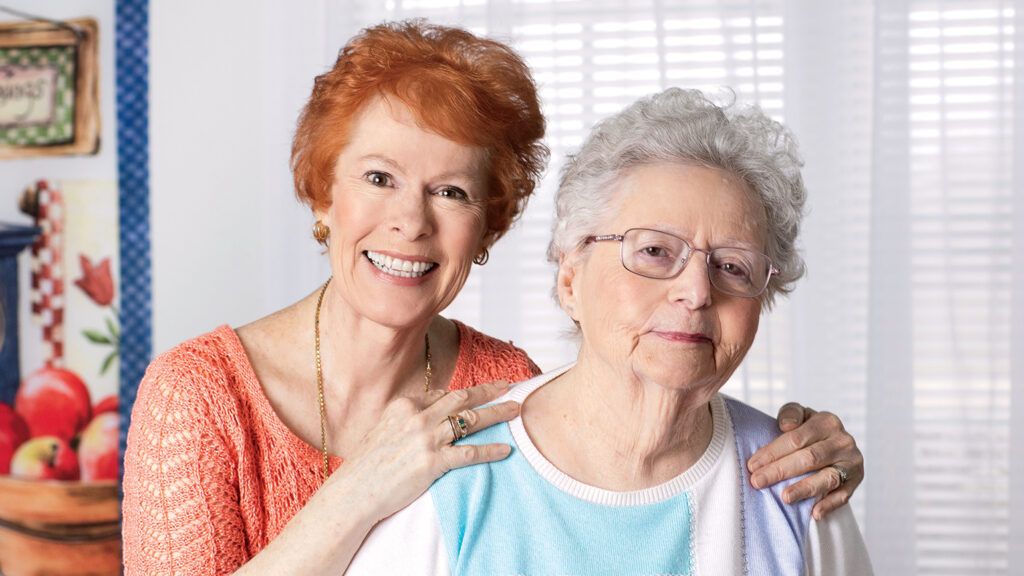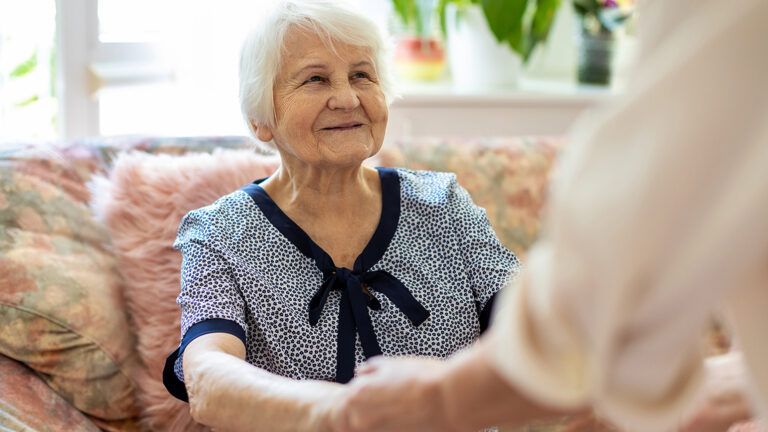“Mom, we need to take you to the emergency room.”
I’d rushed to my mother’s apartment at the assisted living facility with my husband, Kevin, after one of the nursing assistants had found Mom on the floor beside her bed, dazed.
My 92-year-old mother pressed her lips together in a thin line—an expression of defiance I knew all too well. “I don’t need to go to the hospital,” she said. “I just lost my balance.”
I tamped down my frustration. I wanted so badly to be a good daughter. Patient. Kind. Full of grace. But oh my goodness! Could anything be easy with her? Mom behaved like a stubborn middle child even as an adult. Sandwiched between a favored older sister and an adorable baby brother, she’d learned to push back and act out to get attention. But couldn’t she see the huge bruises that were forming on her arms like watercolor splotches? How could I convince her she needed help?
“She keeps tapping on the side of the bed or the bathroom counter,” said the nursing assistant. “As if she’s typing words she can’t think of.”
Mom had worked as an accounting clerk for many years. Her mind must have wandered back to those days. Did she have a urinary tract infection? Sometimes infections caused delirium in the elderly, especially those with Alzheimer’s. Mom had been diagnosed six years earlier, in 2014, not long after she’d moved from the pine forests of northern California to the facility near us in the prairies of Illinois. She had lived on her own until she’d lost everything to a house fire. She was a widow, and my brother had died. I needed to step up and take care of her.
In the beginning, Kevin and I were relieved that she lived so close by. I’ll be the perfect daughter, I thought. I felt guilty that she couldn’t live with us. Our cats might trip her. Kevin and I worked long hours and traveled often. But I promised I would be her advocate and her supporter. I would take care of her the way an aging parent deserves to be taken care of.
Day by day, the reality of having Mom so near sank in. She would call us all the time with some small chore or errand that needed to be done.
“Jeanette, do you have any pink thread?”
“No, Mom. Do you need Kevin to go out and get some?”
“Oh, there’s no rush.”
When Kevin arrived at the facility with pink thread, Mom looked up at him. “Oh,” she said, holding up a needle, “I found some.”
Everything was a problem for Mom. The food at the assisted living facility—“The vegetables are overcooked.” The songs they sang at the socials in the dining room—“They’re too old.” The doctors who tried to help her—“They don’t listen.” I was soon overwhelmed. Mom seemed to need more of my time and patience every day. More than I could give. Friends wrote on Facebook, “It’s an honor and a privilege to care for my aging parent.” Was I doing something wrong?
No matter what I did for her, it never felt like enough. I wanted to be the most patient. The most kind. The best possible caregiver. I wanted to be more than Mom had been for me growing up. When my brother and I were little, she had been warm and doting, a mother right out of storybooks. Then she divorced my father—an alcoholic who cheated on her—when I was six, later marrying another alcoholic.
Unlike my father, who was charming and affable, my stepfather was abusive. He would berate my brother and me, stomping through the house, yelling and cursing. Mom let him. It felt as if she suddenly didn’t care enough to protect us. Had I done something to deserve this? I was too young to understand the complexities of marriage to an addict. All I knew was that I felt alone and abandoned.
That was decades ago, I reminded myself. I’d long since forgiven Mom for the wrongs of my childhood. I’d made her a part of the family I built with Kevin. Why didn’t I feel honored to care for her as the Bible taught? Why couldn’t I be a better daughter?
I looked at my mother, sitting up in her bed at the assisted living facility, her mouth still set in a stubborn line, and took a deep breath. “Mom,” I said, “I’m worried about you because you are confused and you’ve been typing with your hands all day.”
She blinked slowly. “Have I?”
I nodded. “I think you might have a UTI. If we don’t take you to the doctor, it could develop into a kidney infection. Would you put on your coat for us?”
By the grace of God, she relented. Kevin and I drove her to the hospital, and the three of us sat for more than an hour in the waiting room.
“Doris Kidgell?” a nurse finally called. For the next three hours, nurses, technicians and a doctor peppered Mom with questions and marshaled her through a slew of tests. Urine samples. X-rays. Blood work.
“You have to speak directly into her ear,” I had to say again and again. Mom was hearing impaired. Was anybody on staff capable of reading her chart? It was right there in black and white! “She’s lost her hearing aids,” I explained.
None of the staff members seemed to listen. I felt my blood pressure spike every time a nurse or a technician spoke too softly. I understood it took more time to explain things to Mom, but didn’t she deserve the same courtesy as other patients?
“Mom, the doctor wants to keep you overnight,” I said after the first few rounds of tests.
“No,” she whispered.
Her brown eyes seemed enormous behind her glasses; her face, so often fixed in opposition, seemed softer, vulnerable. She looked how I must have looked as a little girl. Scared. Alone. Afraid of being abandoned. I wanted to do everything in my power to protect her. To shield her from pain. It dawned on me that I’d never felt this way about Mom before. It was as if our roles were reversed, as if I were the mother and she were the child.
“They’ll take good care of you,” I said. “Kevin will be here first thing in the morning, and I’ll come to see you on my lunch break.”
As soon as I woke up the next morning, I knew a lunch break visit wouldn’t be enough. Mom needed me. All of me. I took the day off and drove to the hospital. The same feelings from the night before—the ones I’d experienced when my kids were tiny and helpless—welled up inside me. None of my usual guilt or shame. None of the questions that normally cycled through my mind: Am I doing as much as I can? Am I enough? It was pure protective energy.
A young technician came to take Mom for an MRI. “Where are you taking me?” Mom asked.
The technician stopped. “You don’t remember?”
I shot the tech a stern look. I wanted to scream, She’s 92 years old. She has Alzheimer’s. I’m worried she may have had a stroke. Of course she doesn’t remember! Instead, I said calmly, “No, she doesn’t remember.” Then I held Mom’s hand as the technician wheeled her gurney down the hall.
“This is as far as we can allow you to go,” the tech said at the end of the hallway. “You can sit here and relax. We’ll have your mom out in a jiffy.”
No way could I relax. I watched the tech wheel Mom away and felt my heart go after her. This wasn’t about guilt. This wasn’t about obligation. This was about love.
An hour later, the doctor came into Mom’s room and explained she needed surgery on one of her carotid arteries. It was 90 percent blocked. “You’ll need to discuss it with each other and her regular doctor,” he said. He released her to go home, and we scheduled an appointment with a surgeon for the following week.
That evening, Kevin and I hugged Mom goodbye in her apartment at the assisted living facility. It wasn’t until I flopped into my bed that night, exhausted, that I realized the enormity of my devotion to Mom over the past 30 hours. Had I really stood up to those doctors and nurses and technicians? Taken off work? I never do those things, I thought. Maybe I wasn’t such a terrible caregiver after all. Or such a terrible daughter.
A thought flashed through my mind, something my friend Dee had told me when she was taking care of her father-in-law at the end of his life. “There’s no place for guilt in caregiving. All the things you do for your loved one—that’s what really matters.”
If I could forgive Mom for not being a perfect parent when I was a kid, I could forgive myself for not being the perfect daughter and caregiver now. I’d been doing my best to support her, not just for the past 30 hours but for the past six years. Lord, however many more years you give me with Mom, I’ll be beside her. I let go of the idea that the only good caregiver is a perfect one. What I do for my mother is enough. So am I.
For more inspiring stories, subscribe to Guideposts magazine.






